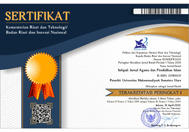Evaluation of Islamic Education: Multi, Inter, dan Transdisciplinary (Philosophical, Theoretical, and Practical)
Abstract
From the Introduction about the meaning of Education, Islam and Evaluation, the author is interested in researching and writing more about (the most interesting) Evaluation of Multi, Inter, Transdisciplinary (MIT) Islamic Education (IE) Philosophically, Theoretically, and Practical. This research approach is a qualitative. The type of this qualitative research is descriptive. This type of research is library. Below the author writes the results and conclusions of the research. The author writes about the meaning of MIT. Philosophical IE is related to the Goals of IE and the Function of Evaluation. Among the aims is to form al-Insan al-Kamil (complete human being) who has 2 dimensions (horizontal dialectical and vertical submission) to the mastery of attitudes, skills, and knowledge-understanding. In relation to the Evaluation Function (EF), that meaning is to assess, measure, motivate, and encourage students to be more serious and successful in the framework of achieving the goals of Islamic education. Theoretical Evaluation of Islamic Education is related to 3 (aspects) of Educational Evaluation Objects (input, transformation, and output) and more specific EF for educators, students, and society. Practical Evaluation of IE practically is related to the 7 Practical EF. For evaluation of MIT Islamic education philosophically, theoretically and practically, according to the author, the discussion above regarding evaluation, EE or evaluation of IE philosophically, theoretically and practically just needs to be linked to the MIT discussion. The author also writes examples linked to Multidisciplinary Evaluation and linked to PAI to be more specific. A number of PAI Assessment Forms, Multidisciplinary Approaches or Perspectives that can be used can be adapted from the Curriculum Integration Model that Fogarty developed according to the integration characteristics that are the focus or emphasis. The examples are the Core Competencies and Basic Competencies of Islamic Religious Education and Characters for Junior High School / MTs Class VII. Those core are spiritual attitudes, social attitudes, knowledge, and skills.
Keywords
Full Text:
PDFReferences
Abudin Nata. (2005). Filsafat Pendidikan Islam. Jakarta: Logos. 188.
Ahmad Tafsir. (2012). Ilmu Pendidikan Islam. Bandung: P.T. Remaja Rosdakarya. 35 dan 36.
Anas Sudijono. (2001). Pengantar Evaluasi Pendidikan. Jakarta: Cetakan III Raja Grafindo Persada. 1.
Arief B. Iskandar. (2010). Tetralogi Dasar Islam: Pelengkap Materi Dasar Islam. Bogor: Al-Azhar Press. 74.
Badan Koordinasi Lembaga Dakwah Kampus. (2006). Mafahim BKLDK. Malang: Koornas BKLDK. 183.
Daryanto. (2011). Evaluasi Pendidikan. Jakarta: Cet. III Rineka Cipta. 19 s.d 21.
Dr. Haji Husnul Yaqin, M.Ed. (2010). Sistem Pendidikan Pesantren di Kalimantan Selatan. Banjarmasin: Antasari Press, Cetakan II Juli 2010. 188 dan 192.
Hafidz Abdurrahman. (2004). Diskursus: Islam, Politik, dan Spiritual. Bogor: Al-Azhar Press. 53 dan 199.
Hamzah Uno. (2007). Perencanaan Pembelajaran. Jakarta: Bumi Aksara. 95.
Hasan Langgulung. (1985). Pendidikan dan peradaban Islam. Jakarta: Indonesia. 3.
H. Moh. Kasiram. (2010). Metodologi Penelitian Kualitatif-Kuantitatif. Malang: UIN Maliki Press. 355.
Milyasari dan Asmendri. (2020). Penelitian Kepustakaan (Library research) dalam Penelitian Pendidikan IPA, Vol. 6, No. 1. 43.
Muhammad Amin Abdullah. (2022). Multidisiplin, Interdisiplin, & Transdisiplin: Metode Studi Agama dan Studi Islam di Era Kontemporer. Sleman, Yogyakarta: IB Pustaka, Cetakan IV Februari 2022. viii, xii, ix, xvi, ix, dan x.
Muhammad Yusuf Aminuddin, Mujamil Qomar, Akhyak, I. A. (2021). INTERNATIONAL JOURNAL OF Integrative-Transformative Curriculum Development in Learning Quality Assurance. International Journal of Science Arts and Commerce, 6. 22–37.
Nurul Ulfatin. (2015). Metode Penelitian Kualitatif di Bidang Pendidikan : Teori dan Aplikasinya. Malang: Media Nusa Creative Publishing. 24 dan 46.
Omaar Mohammad al-Toumu M. Syaibany. (1979). Falsafah Pendidikan Islam. Jakarta: Cet. I, Bulan Bintang, 1979. Alih bahasa Dr. Hasan Langgulung. 339.
Ramaliyus. (2004). Ilmu Pendidikan Islam. Jakarta: Kalam Mulia. 25 s.d 28.
Robin Fogarty. (1991). Integrating the Curriculum: Ten ways to Integrate Curriculum. Educational Leadership. 61–66.
Sugiyono. (2021). Metode Penelitian Kuantitatif Kualitatif dan R & D. Bandung: Elfabeta. 270.
Suharsimi Arikunto. (2003). Dasar-Dasar Evaluasi Pendidikan. Jakarta: PT Bumi Aksara. 10 dan 11.
Suharsimi Arikunto. (2006). Prosedur Penelitian: Suatu Pendekatan Praktik (Edisi Revisi VI). Jakarta: P.T. Rineka Cipta. 118.
Sukandarrumidi. (2012). Metodologi Penelitian. Yogyakarta: Gajah Mada University. 44.
Taqiyuddin an-Nabhani. (2003). Peraturan Hidup dalam Islam. Jakarta: Pustaka Fikrul Islam, Cetakan ke-29 Januari 2023. Diterjemahkan oleh Abu Amin dkk. 117.
Yusuf Al-Qaradhawy. (2010). 7 Kaidah Fikih Muamalat. Jakarta Timur: Pustaka Al-Kautsar. Diterjemahkan oleh Fedrian Hasand. 11.
Zetty Nurzuliana Rashed, Ab Halim Tamuri, Siti Suhaila Ihwani Mohd Faeez Ilias, M. Y. (2020). Model Kurikulum Integrasi dalam Kurikulum Pendidikan Islam. Islāmiyyāt, 42(0). 51–58.
Undang-Undang No. 20 Tahun 2003 tentang Sistem Pendidikan Nasional.
https://dictionary.cambridge.org/dictionary/english/evaluation. (2020). Diunduh Kamis 9 November 2023 Pukul 12.25 Wita.
https://kbbi.web.id/evaluasi. (2016). Diunduh Kamis 9 November 2023 Pukul 12.33 Wita.
DOI: https://doi.org/10.30596/19485
Refbacks
- There are currently no refbacks.
Intiqad Jurnal Agama dan Pendidikan Islam is abstracting & indexing in the following databases:
View My StatsEditorial Address:
Faculty of Islamic Religion, Universitas Muhammadiyah Sumatera Utara. Jl. Mukhtar Basri No. 3 Medan 20238 Telp. (061) 6622400 ext. 27 dan 28 Fax. (061) 6625474. e-mail: intiqad@umsu.ac.id

_(1).png)























